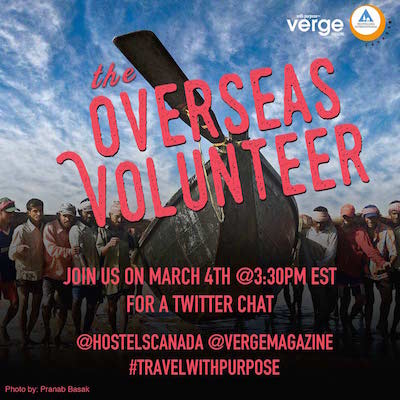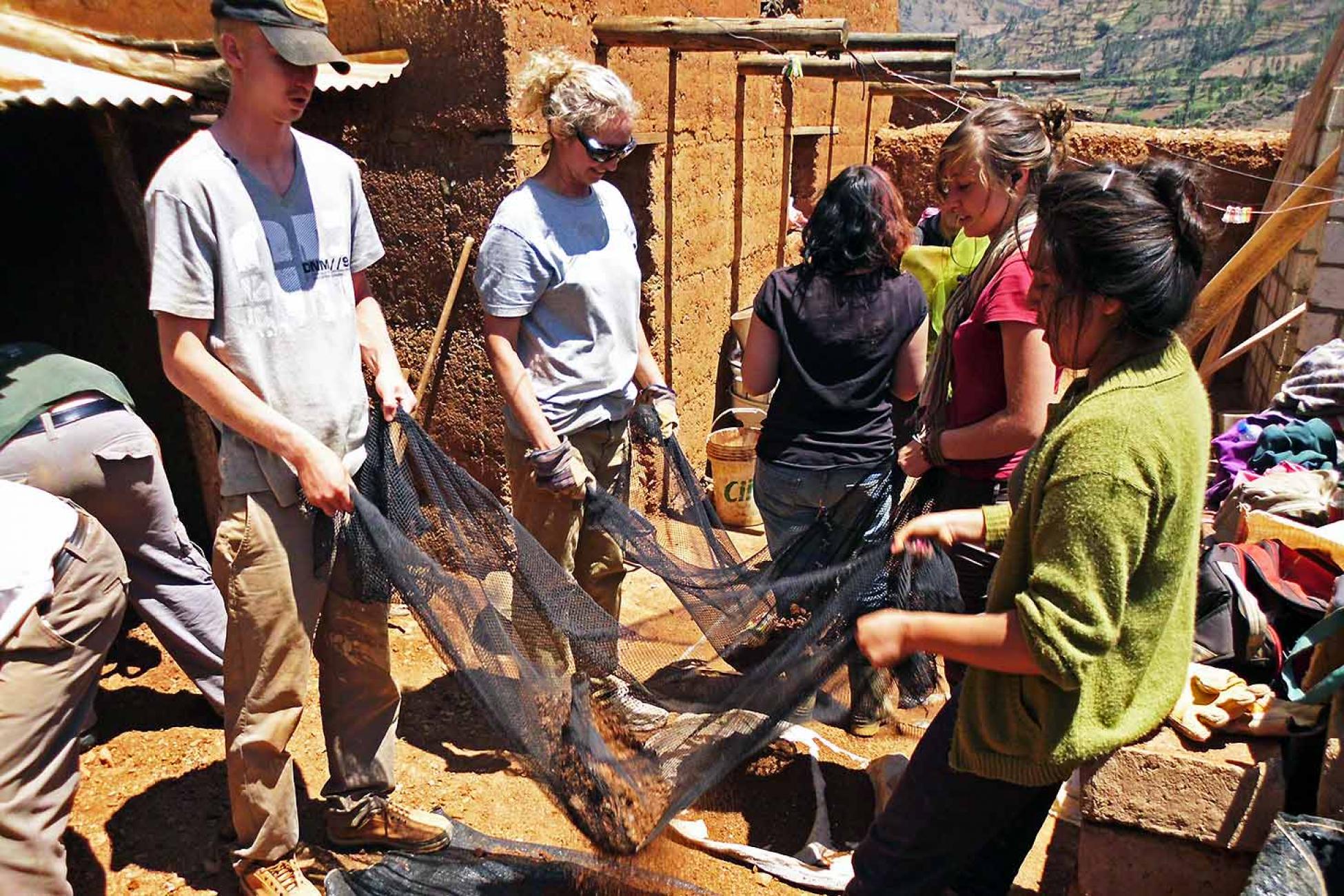Every year, the team at Verge Magazine speaks with hundred of prospective overseas volunteers at our Go Global Expos. Most have the same pressing questions: “How do I choose an organization?” and “Why do I have to pay to volunteer overseas?”
We decided to call in the experts for the answer to these—and all your other burning questions—about volunteering overseas for the first time.
Our online panel this week includes:
• Sébastien Maillette is the Communications Coordinator, Programming for Canada World Youth (CWY), an international volunteer program for youth from Canada and abroad. Sébastien has been working in the international volunteer sector for more than 10 years.
• Rick Tait is the Senior Director of Habitat for Humanity Canada’s Global Village Program, a program that over the last 10 years has mobilized over 13,000 volunteers to help build homes in 47 countries around the globe and in Canada. Rick is a passionate advocate for international volunteerism and regularly leads trips around the world.
• Linda Stuart is the GCN - ISE Institute Director. She is the Board Chair of International Volunteer Program Association, which represents standards and best practices for international volunteering. Linda has also partnered with over 15 indigenous communities worldwide and spent time as a qualified administrator and coach for various intercultural competency instruments.
How should prospective volunteers choose a reputable volunteer abroad organization or project?
Linda: First and foremost, ask yourself “why am I doing this? What are my motivations? What are my intentions?”
Educate yourself on the difference between non-profit volunteer-sending organizations, for-profit companies, government-based agencies and faith-based opportunities. Choose an organization that reflects your values. Ask and learn about the sustainability of projects. If you are going to teach English who is going in there after you? Is this a onetime benefit?
Seek organizations that are members of best practice alliances and that meet minimum standards in volunteering abroad. One such association based in the US is the International Volunteer Program Association. Its members adhere to 35 best practices and are reviewed annually. Only trust organizations that offer referrals from past program participants (beyond their staff/official spokespeople).
Sébastien: It can be difficult for potential volunteers to identify which organizations manage to balance a meaningful experience for the volunteer with positive results in the community.
Some of the qualities that youth should look for when exploring a volunteering experience include:
• The presence of pre-departure and return orientation sessions that can foster a reflection on the ethical dimensions of volunteering and potential impact of their experience
• The presence of additional structured learning activities, which can allow volunteers not only to develop new skills, but most importantly to ensure that they can continuously reflect critically on important elements, such as power dynamics and inclusion.
• The presence of sound risk management policies. Some of the elements that one should look for include the screening process prior to acceptance as a volunteer and clear safety guidelines.
• The presence of long-term partnerships with overseas organizations.
Rick: There are three things that volunteers should look for: Is the program set up with proper pre-trip orientation, on-the-ground support while in-country, emergency procedures and insurance and re-entry counselling? Is the work you are doing needed and meaningful? Does the organization have a clearly stated purpose for the work it is doing? How does the organization or company directs use of your money? Are the funds being used responsibly?
Many would-be volunteers wonder why they have to meet a fundraising goal or pay in order to volunteer overseas. Can you shed some light on this complex issue?
Rick: I had the exact same reaction when I first looked into volunteering internationally many years ago. I thought that I had all these great skills that I was willing to donate to a “needy” organization and they would be thrilled to have me with all I had to offer. Then I went to Kenya for three months and had my eyes opened.
The reason we volunteer internationally is to “add value” to the work an organization is doing and we do that by giving our time, donating our money and becoming advocates for the work being done when we return home. If it costs the organization money (money that it could otherwise be using to further its mission in other ways) then we are really not having the maximum impact we can have through our volunteering.
Sending and hosting international work teams and doing it well is a time-intensive and costly undertaking, one that would not be possible if volunteers were not so generously willing to cover their own expenses. We get this very question many times a year, but rarely if ever from someone who has already volunteered internationally and experienced the need firsthand.
Sébastien: From an educational perspective, fundraising gives youth volunteers the chance to develop organizational and communication skills, and to learn more about their community as they establish relationships with potential donors. Youth volunteers also develop increased financial literacy, as well as their sense of responsibility and learn to respect contracts. From an organizational perspective, fundraising is a form of public engagement, as youth volunteers' fundraising activities raise general public awareness about an organization.
Linda: Someone is paying. There are no “free” experiences. There are direct costs (travel, lodging, meals, contributions to the project, relationship maintenance, emergencies, honorariums, medical and evacuation insurance, program coordination, staff). You certainly have the right to get transparent program fee information from the volunteer sending organization—and if they can’t provide it that may be a red flag.
How can volunteers set realistic goals and expectations for their overseas experience?
Rick: I love it when people use the word “expectations” when talking about preparing to volunteer internationally because that is what it’s all about. Whenever I have heard of people having bad experiences volunteering, it’s because expectations weren’t met.
Before you decide to volunteer abroad, ask yourself these questions: Why am I doing this? What do I have to offer? What do I hope to gain? Then go looking for a program that will meet those expectations. If you can’t find an organization that will meet all your expectations, then you need to decide if you are willing to change your needs or if this might not be the right type of volunteering for you.
Sébastien: Participating in pre-departure sessions, researching about the geographical location where the volunteering experience will take place, reading different perspectives about the issue that is being addressed by a volunteering program or project (e.g., environmental sustainability, gender equity, food security, etc.) can allow volunteers to situate their contribution within a broader context prior to leaving Canada.
Making conscious efforts to learn and unlearn and reflect critically on development issues is also important. Once overseas, being proactive at listening to local peers can allow for an increased understanding of the agency, resilience, power and capacity of youth.
What qualities or skills does an effective overseas volunteer possess?
Rick: The superstar overseas volunteer is someone who understands that volunteering is about working with people to make a difference. It’s not about doing “charity” work; it’s about working alongside someone to make a difference in the world. Other adjectives that come to mind are flexible, accepting, healthy, willing, easygoing, safety conscious—and did I say flexible?
Linda: Curiosity, a disposition to look at new and different experiences. Awareness of oneself, including values, beliefs, capabilities, limitations—and an understanding of how that impact others. An ability to hold positive regard for others, including a willingness to withhold or suspend negative judgments about situations or people. Finally, emotional resilience: the strength and ability to cope well with setbacks, mistakes or frustrations.

Want to ask our experts for more advice (and maybe win some prizes in the process)? Join Verge Magazine, Hostelling International Canada and HI Boston for “The Overseas Volunteer” Twitter chat on Wednesday, March 4th. Log on at 3:30 PM EST and look for the hashtag #travelwithpurpose.
Add this article to your reading list



